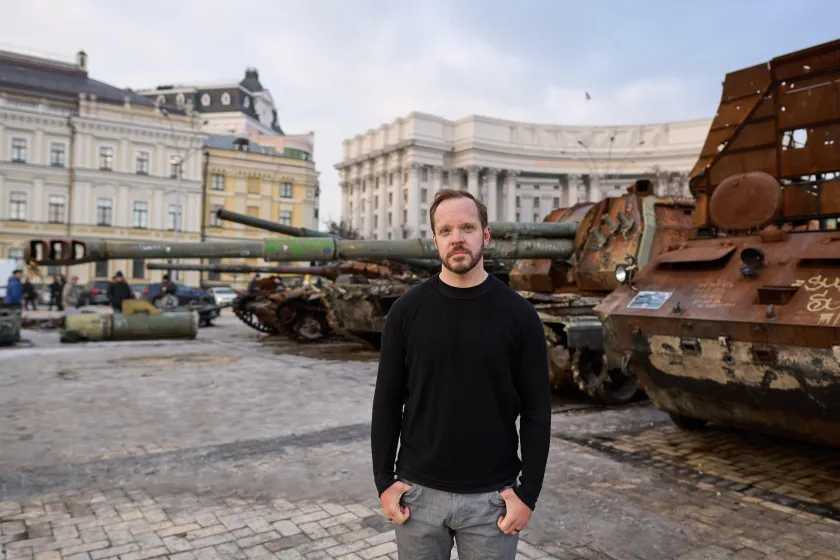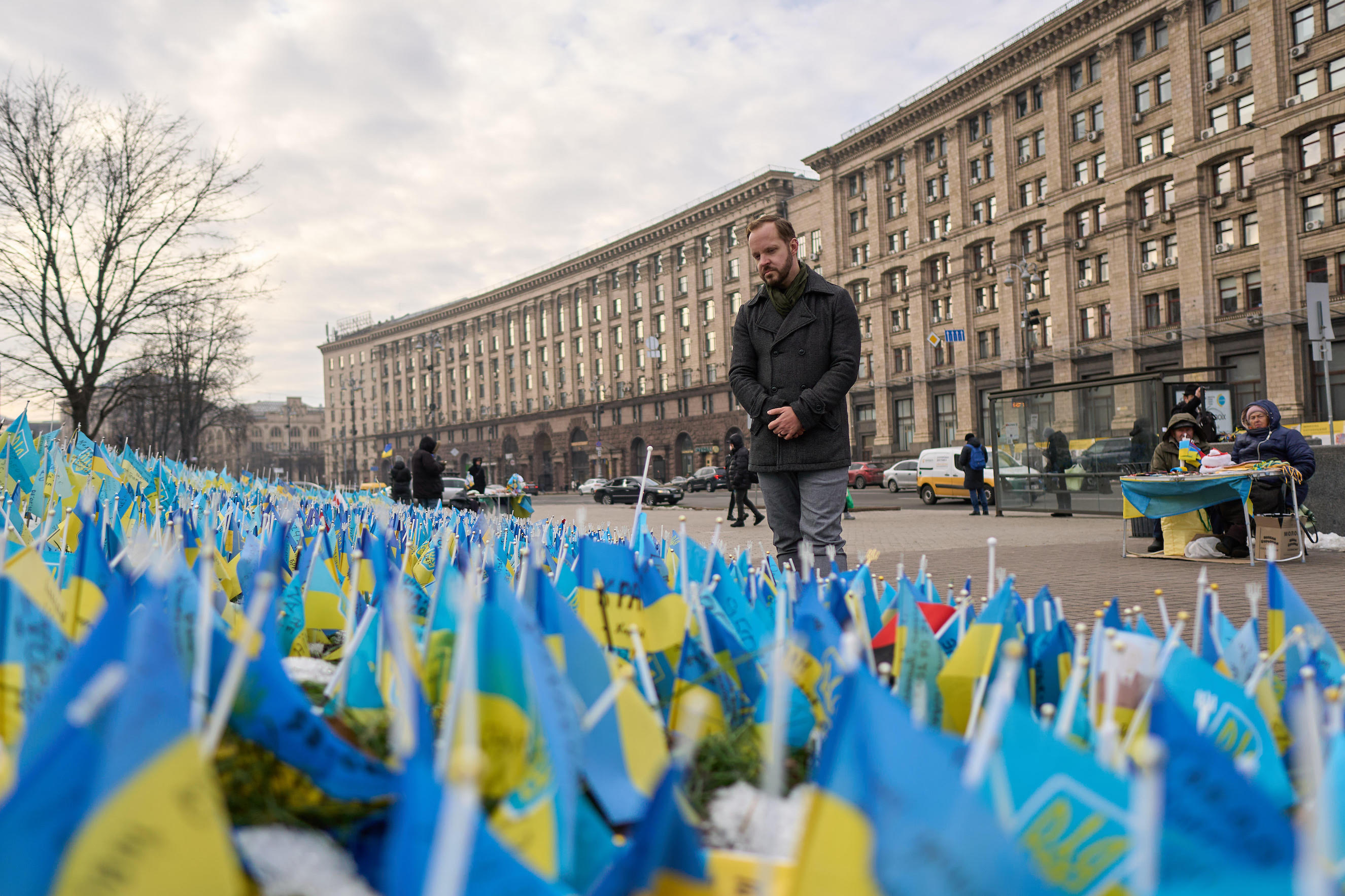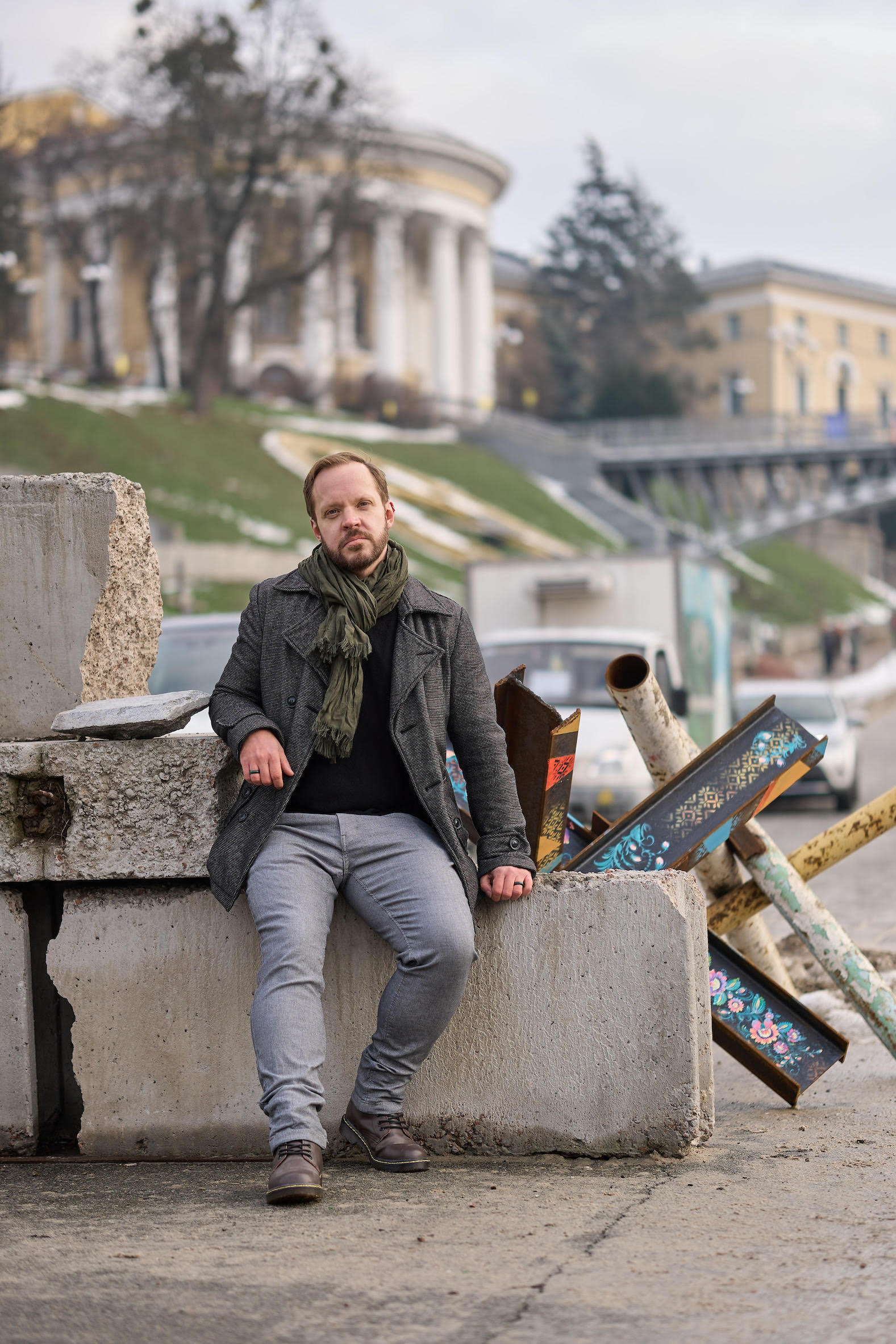As Russian forces continue with heavy artillery shelling and frequent missile strikes that have resulted in thousands of deaths and extensive destruction in Ukraine, Northern Michigan University alumnus Matt Maki has no plans to leave the country he has called home for the past decade. The Negaunee High School graduate lives in Kyiv, the nation's capital and most populous city.
Maki works full time for an IT company, teaching English and offering other support. He also freelances as an English as a Second Language (ESL) instructor. While he admits this has been the most frightening period since he relocated to Ukraine, he also said it is the most uplifting and optimistic, watching the beauty of the human spirit displayed through unity, cooperation and resilience.
“Putin thought there was no spirit to break here; he was wrong,” Maki said. “He helped to make Ukraine the most heroic country in the world through its fight for democratic ideals. Instead of rolling over, Ukrainians are more determined than ever to celebrate their culture, identity and language. Even when things are objectively terrible, I've never seen people more positive and helpful than now. There are no petty squabbles because little things don't matter; Ukrainians are focused on the big picture and just dealing with what happens.”
Maki vividly recalls an early October attack on Kyiv. He was visiting another city on that day, but returned to realize that the departure from his usual routine likely saved his life. Time signatures from security camera footage of missile strikes at a small park playground, a university campus and a suspended glass bridge matched the times he typically passed through them each day. “That shook me for about a week,” he said.
Another temporary absence spared Maki from the initial assault on Kyiv during its Feb. 24 invasion. He was at his IT company's Lviv office, scheduled to help with an English Week event. He wound up staying through March, living out of a backpack longer than expected and serving as the temporary office manager. Maki kept the facility open for people who needed a place to work, evacuate, sleep, eat or take a shower. He also participated in other volunteer activities related to the war effort.
The military activity has disrupted daily life, with power outages among other issues. Although Maki has lost a friend and also a coworker to the war, he has not personally witnessed any deaths. Such was not the case during the 2014 Russian invasion of Ukraine, when he saw lifeless bodies that had been shot, lying on the ground in Kyiv.
That crisis was preceded by the Revolution of Dignity. Maki joined anti-government protesters supported by the U.S. and Europe in rallying against corruption and toppling the administration of former Ukrainian President Viktor Yanukovych, who was supported by Russia. Maki said visual evidence of the seismic shift in ideals included cleaner streets, smiling residents and new businesses and restaurants. In an attempt to salvage some of its power in the region, Russia invaded and annexed Crimea before launching a full-scale invasion of eastern Ukraine in August 2014.
“I learned the smell of death from that,” said Maki, who earned a 1997 bachelor's degree in English and psychology and a 2006 master's in English. “Many forget Ukraine has essentially been at war with Russia since then, because they've had an active daily presence in the country. Interventions, strong sanctions, protective weapons and other assistance could have come in any of the previous eight years. Then it all blew up last February, and it was suddenly a big thing on Western media. Now there's a constant fear of escalation and Russia possibly using nukes, especially if the U.S. sends forces here.
“This isn't just a spat over disputed territory, it is a genocide. We know from a lot of evidence that Russia, when it invades and takes territories, is torturing and killing men, raping and killing young women, forcing old women to work as slave cooks and deporting children to Russia to be re-educated. War crimes are more mentally disturbing to me than deaths from fighting. I try to tackle them in my own creative writing, but it's impossible to convey the horror with words.”
Ukraine President Volodymyr Zelensky made a surprise visit to the United States and addressed Congress shortly before Maki was interviewed. He also made a Jan. 10 video appearance during the Golden Globes awards ceremony. Maki said many initially doubted the capability of an actor/comedian with virtually no political background to become president.
“He is perfect for this war,” he added. “He knows how the optics look, and how to deliver an amazing speech. Within the first hour of war, he knew the impact it would have to be highly visible on his cell phone outside the presidential administrative building with his closest advisers, to show they were all here and not going anywhere. A more seasoned politician might have been in a bunker, evacuated or exiled to another country. I've been very impressed with his performance, and it's great he has a good relationship with the U.S.”
Maki's decision to relocate overseas was rooted in Marquette, where he had returned after completing graduate school at the University of Alabama. He had co-founded the Marquette Poets' Circle, but fueled by a frustrating job market for a prospective university faculty member and the associated financial challenges, he accepted a friend's invitation to join her in visiting a relative in Ukraine. His friend eventually returned to the Upper Peninsula, but Maki became enamored with Kyiv and stayed.
“As terrible as it can get with what's happening, I've never regretted it. I can wake up to an air raid siren, or see empty supermarket shelves and demolished buildings, and feel more capable of coping and dealing with that than the depression and anxiety I experienced in the U.S. It's hard to listen to news reports on NPR about the extreme political divisiveness and negativity there. Ukraine is far from perfect, but there had been noticeable progress every year after the Russian puppet government was forced out. It's always interesting, in both good ways and bad.”
Still a writer at heart, some of Maki's poetry appears in the 10th anniversary Superior Voyage anthology, which just received a U.P. Notable Book Award.
“Poems I had written and loved before the invasion—about trying on clothes or feeling lonely during a rainstorm—just didn't seem important anymore. I felt like they were first-world problems compared with what was going on in Ukraine. I wrote in a journal every day to process what was happening with the invasion, struggling to capture the truth while still producing something people will want to read. All of my poems in the anthology were pulled from my journal.”
Maki said his generalist NMU English education helped him land in Ukraine and step into viable jobs, the pedagogy track allows him to approach lesson plans more effectively, and the psychology courses gave him a foundation for patience, listening skills and analyzing students' emotional states and what motivates them. The soft skills he developed in the Student Leader Fellowship Program have also proved valuable in helping him adapt in work, volunteer and even social situations in this new culture.



